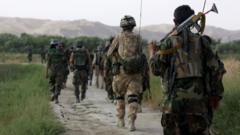In recent years, a movement of survivors has emerged in Ireland, revealing the formidable trauma inflicted by sexual abuse in Catholic schools. These men, largely in their 50s and 60s, have begun to break decades of silence, speaking out about the horrors they faced in institutions run by religious orders.
The cumulative findings from a preliminary government inquiry have been staggering, uncovering nearly 2,400 allegations of abuse within religious schools from the 1960s to the 1990s, involving at least 884 alleged perpetrators. "The scale of these revelations is beyond shocking," remarked Norma Foley, Ireland's Minister for Education, as she greenlit a comprehensive investigation into this heart-wrenching issue.
While Ireland has been confronted with the aftermath of widespread abuse in church-run institutions for years, recent testimonies provide a more comprehensive understanding of how numerous schools allegedly shielded serial offenders for an extended period. The courage demonstrated by these survivors has sparked a critical discourse concerning accountability, masculinity, and the deep-rooted societal taboos surrounding sexual abuse.
Tim Chapman, an academic specializing in restorative justice, noted the profound ripple effects this issue has created, highlighting how the trauma experienced by numerous victims has far-reaching implications for Irish society. The revelations not only illuminate the tragic stories of individuals like John Coulter and Mark Vincent Healy—who have shared their painful memories of abuse—but have also initiated a collective journey towards healing and justice.
The former students, now united in survivor groups, demand answers and accountability from the institutions that harbored abusers. As they continue to share their stories, they challenge the stigma and shame that has silenced many for far too long, forging a path for greater understanding and accountability within Ireland’s historical landscape of abuse.
The cumulative findings from a preliminary government inquiry have been staggering, uncovering nearly 2,400 allegations of abuse within religious schools from the 1960s to the 1990s, involving at least 884 alleged perpetrators. "The scale of these revelations is beyond shocking," remarked Norma Foley, Ireland's Minister for Education, as she greenlit a comprehensive investigation into this heart-wrenching issue.
While Ireland has been confronted with the aftermath of widespread abuse in church-run institutions for years, recent testimonies provide a more comprehensive understanding of how numerous schools allegedly shielded serial offenders for an extended period. The courage demonstrated by these survivors has sparked a critical discourse concerning accountability, masculinity, and the deep-rooted societal taboos surrounding sexual abuse.
Tim Chapman, an academic specializing in restorative justice, noted the profound ripple effects this issue has created, highlighting how the trauma experienced by numerous victims has far-reaching implications for Irish society. The revelations not only illuminate the tragic stories of individuals like John Coulter and Mark Vincent Healy—who have shared their painful memories of abuse—but have also initiated a collective journey towards healing and justice.
The former students, now united in survivor groups, demand answers and accountability from the institutions that harbored abusers. As they continue to share their stories, they challenge the stigma and shame that has silenced many for far too long, forging a path for greater understanding and accountability within Ireland’s historical landscape of abuse.





















